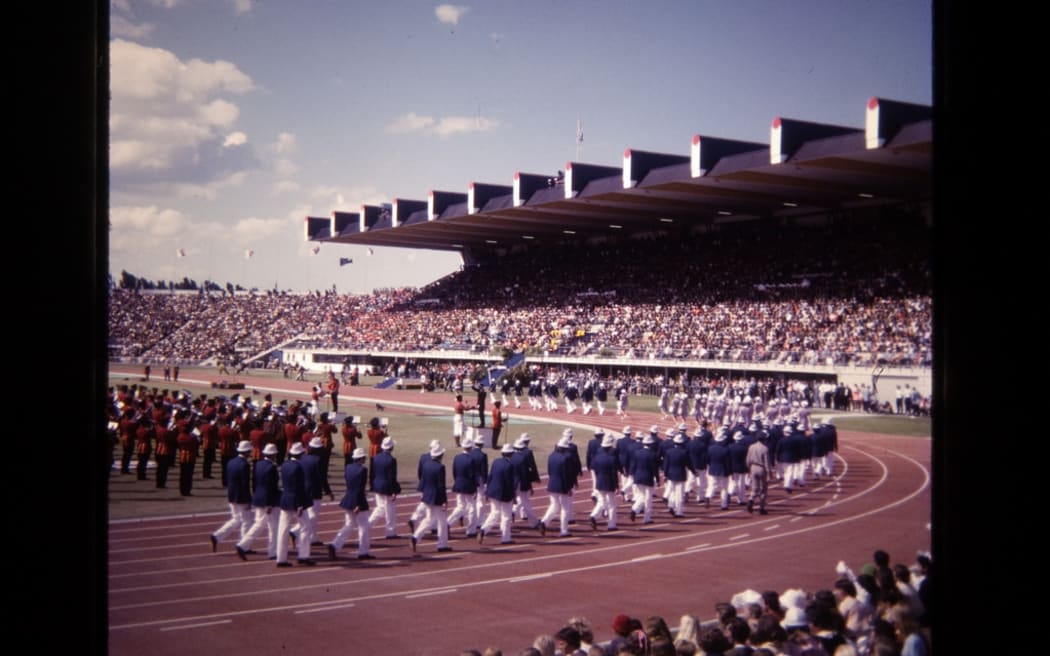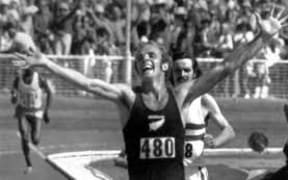
Commonwealth Games, Christchurch 1974 Photo: Flickr
* This story has been updated, with Gerard Smyth's name corrected.
A veteran television producer has described the arrival of colour television as one of the biggest broadcasting breakthroughs of the time.
The reflections come 50 years after the 1974 Christchurch Commonwealth Games opened, an occasion which also marked most New Zealanders' first glimpse of colour television.
The Christchurch games dubbed "the friendly games" marked the second time New Zealand had hosted an incarnation of the multi-sport event, after Auckland staged the British Empire Games in 1950.
Colour television was officially launched in New Zealand in October 1973, two months before Christchurch games.
It also came 13 years after television was first broadcast in New Zealand.
According to Te Papa, the first K9 colour television set was was purchased by the Paterson family in Wellington in August 1973.
Producer George Andrews, who has been making documentaries about New Zealand for more than half-a-century, was a reporter for the BBC at the '74 games.
He said colour television enriched the live broadcast experience for viewers.
"The fact that it was colour television and that it was a huge first made it [the games] all the more exciting," he said.
The thrill was given a further shot in the arm when Dick Tayler galloped to gold in the 10,000 metres.
"That was about the most spectacular opening that New Zealand could've imagined ... that gave the event an enormous impact."
Andrews ranked both colour TV's debut and the 1975 Telethon broadcast - that launched TV2 - as the two biggest television events of the 70s.
Retired business owner Tony Graham ran a TV repair and electronics store in Hokitika for nearly 50 years.
He explained it took several years before manufacturers could meet the demand.
"Colour TV sets fell on allocation from the manufacturer.
"In Hokitika, there was only about half-a-dozen colour TVs anyway at that stage and they were just being supplied in ones and twos by different manufacturers.
"It took a while before there was a reasonable amount of TV sets in the town."
Graham said the backlog lasted for "several years".
The colour television furore of the mid-70s has also been referenced in local film and television over the past decade.
The first ever episode of New Zealand television series Westside - James Griffin and Rachel Lang's award-winning prequel to Outrageous Fortune - was set against the backdrop of the 1974 Commonwealth Games.
One of the episode's storylines centres on Ted West's gang robbing a supply of Phillips K9 televisions because of their $700 price tag.
"Everyone wants colour for the games," Pana Hema Taylor's Bert Thompson says.
Veteran cameraman Gerard Smyth was a cameraman at the '74 Commonwealth Games.
He said the transformation for camera operators wasn't as dramatic as it was for the "sparkling coverage" audiences saw.
"The cameraman still saw black and white so we didn't see much difference."
Smyth said the 10 day experience of the Commonwealth Games was probably the "best time Christchurch ever had".
By 1975, everything from international sport, to election campaign adverts to the classic Great Crunchie Train Robbery ad were being seen in full technicolour.
The first All Blacks test broadcast in colour was, ironically, one when the team weren't in even playing in black.
The famous All Blacks-Scotland test at Auckland's Eden Park, later dubbed the "waterpolo test" was possibly the wettest rugby test ever played in this country.
Fifty years on, industry veterans admit colour television isn't as important to New Zealanders as it was during its auspicious beginnings.
"The world has changed," Andrews said.
"Broadcast television will never be as important as it was then ... but it's still about telling stories with pictures."
The Christchurch City Council is now looking to revive the colourful days of 50 years ago.
Elected members have narrowly agreed to consider a bid for a future Commonwealth Games event.


